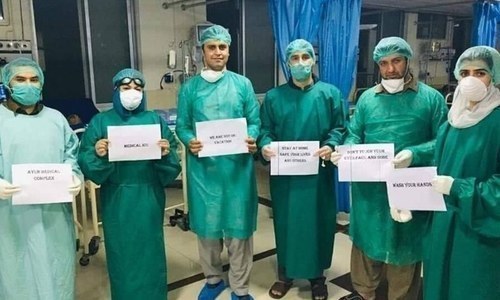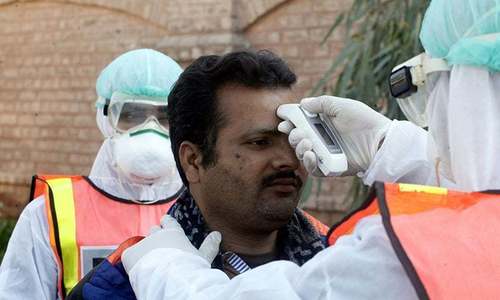PESHAWAR: The World Health Organisation is concerned over less Covid-19 testing in Khyber Pakhtunkhwa and wants the government to scale up testing capacity to know about the exact quantum of pandemic, according to officials.
WHO chief is visiting Peshawar on Thursday (today) to discuss the issue of less testing with the health minister, according to Islamabad-based officials.
They said that Khyber Pakhtunkhwa has been recording 19 per cent positivity of its total swabs for the pandemic which was the highest number recorded by any province in the country. They said that it was alarming and more testing was needed to get clear picture about the level of infectivity in the province.
The officials said that Peshawar, Swat, Abbottabad, Lower and Upper Dir, Mardan, Swabi, Bajaur, Nowshera and Karak districts were hard-hit areas in the province where testing should be increased.
“We have been urging all the provinces to conduct at least 5,000 to 10,000 tests per day to be able to know about the level of the infected people and segregate them from the general population. However, the testing number isn’t up to a desired level,” senior WHO officials said.
World health agency wants 5,000-10,000 tests conducted daily
A report by the world health agency on Wednesday pointed out that Swat and Peshawar had high positivity rate of 15 and 14 per cent respectively which was not a good omen for the government as it suggested that cases were present but due to fewer tests, the correct number of patients couldn’t be diagnosed.
Officials said that Rawalpindi had 10 per cent positivity, Multan and Karachi eight per cent each, which showed that Khyber Pakhtunkhwa had the highest positivity ratio in the country, warranting to speed up testing.
“In such a situation, Covid-19 cannot be expected to fade away but can re-bounce if we fail to scale up level of testing,” they said.
The WHO wants the Khyber Pakhtunkhwa government to conduct at least 5,000 tests per day. At present, Sindh conducts 9,000 tests on daily basis, followed by Punjab with 7,000 while KP and Balochistan test only 1,700 people which is far less than the WHO’s guidelines.
“On Wednesday, the province conducted only 1,150 tests which in no way meet the target set forth by the WHO. We need to enhance investigation at this stage and shouldn’t celebrate because lesser cases don’t indicate lesser infectivity,” said officials.
They said that there was need for contact tracing and also random testing in areas where smart lockdown was imposed to know the level of incidence there. They added that countrywide number of tests was below 35,000 per day.
The officials said that Khyber Pakhtunkhwa government had assured the WHO that it would enhance testing capacity to about 10,000 per day by end of July but the level of tests was going down.
Officials said that WHO country chief Dr Palitha Mahipala would be visiting Khyber Pakhtunkhwa on Thursday where he would attend a ceremony regarding testing situation at Khyber Medical University.
Recently, the WHO and health department conducted an assessment about the Covid-19 laboratories in the province on which a presentation would be also given to the world health agency chief.
Khyber Pakhtunkhwa Health Minister Taimur Khan Jhagra and Health Secretary Syed Imtiaz Hussain Shah will be present at the briefing, which will also look into the issue concerning less testing at a time when the province has developed 17 Covid-19 laboratories and is able to conduct more tests.
The government developed 12 state-run and five private laboratories during the Covid-19 crisis with the assistance of Khyber Medical University.
Published in Dawn, July 30th, 2020













































